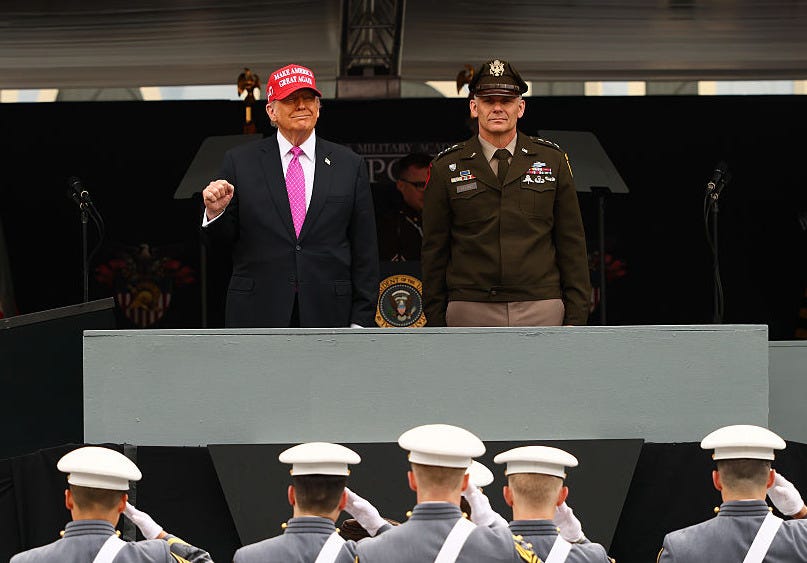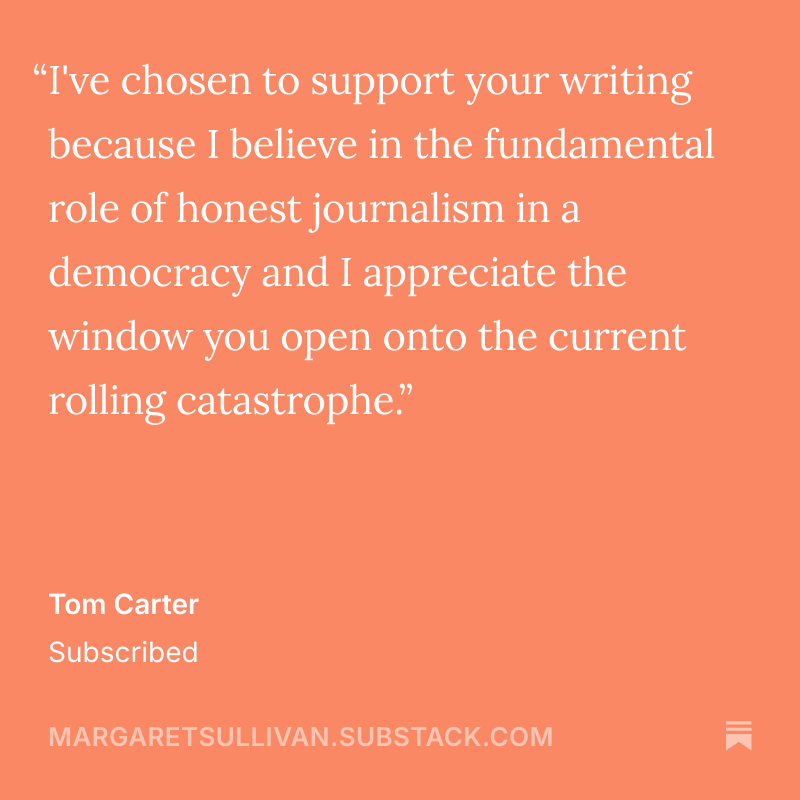How to stand your ground, in three (not so easy) steps
On dueling commencement talks, NPR's new lawsuit and and a warning about Paramount's 'possible bribe'
One reason — maybe THE reason — that people and institutions buckle to Donald Trump’s threats is fear.
We’ve seen a lot of that. Law firms, universities, businesses — all quaking in their boots, giving up on basic principles in hopes of appeasing the punitive president.
But not everyone. Not every institution. Three examples from recent days have a lot to teach us about courage and the backlash that can result.

Example One: Scott Pelley in a recent commencement address at Wake Forest University decided to tell some blunt truths to this year’s graduates. Now, he’s under ugly attacks from the right.
Maybe you’ve seen the video, as Pelley — one of the most prominent faces of CBS News and its flagship magazine show ‘Sixty Minutes’ — spoke passionately.
“In this moment, our sacred rule of law is under attack. Journalism is under attack. Universities are under attack. Freedom of speech is under attack.”
Pelley never mentioned Trump by name, as you can see in this transcript. That didn’t stop the backlash when right wing social media discovered the speech in the past few days. “This self-important, sermonizing propagandist is what passes for a legacy media ‘journalist,’” one of them lashed out. The pro-Trump podcaster Scott Adams called the speech angry and unhinged.
I can tell you from personal experience that it’s no fun to be the object of these attacks, even if they remain “only” in words.
Wake Forest, to its credit, praised the speech as filled with urgency and hope.
I admire Pelley’s journalism and his willingness to stand firm, which he also did on the air after “60 Minutes” executive producer Bill Owens stepped down; Owens said he felt his editorial independence had been restricted. The background here is that Trump is suing for $40 billion — yes, that’s a “b” — over a “Sixty Minutes” interview with Kamala Harris during the presidential campaign. And CBS News’s parent company, Paramount, wants to clear the path for a lucrative media merger. I wrote about that here last week, after CBS News president and CEO Wendy McMahon resigned under pressure.
Example Two: I also was struck by the tough-minded communication to Shari Redstone — the controlling shareholder of Paramount — from the Freedom of the Press Foundation, as they threatened a suit.
“Corporations that own news outlets should not be in the business of settling baseless lawsuits that clearly violate the First Amendment and put other media outlets at risk,” said Seth Stern, director of advocacy for Freedom of the Press Foundation.
FPP warned that it will sue if Paramount settled the defamation lawsuit brought by Trump, and it stated that such a settlement “could amount to a bribe” to the president and his administration.
That warning echoes what three senators (Elizabeth Warren, Bernie Sanders and Ron Wyden) had to say about where Paramount seems to be headed as it negotiates with the Trump administration. “If Paramount officials make these concessions in a quid pro quo arrangement to influence President Trump or other administration officials, they may be breaking the law,” they wrote. It’ll be interesting and telling to see if Paramount stiffens its spine.
Example Three: NPR, as of Tuesday, is fighting back in court over the loss of federal funding resulting from a recent Trump executive order; it seeks to end all federal funding to NPR and PBS.
Joining forces with Aspen Public Radio, Colorado Public Radio and KSUT Public Radio (these are member stations that represent rural, urban and tribal communities), NPR’s president Katherine Maher said they are taking the court action “both as a matter of principle and necessity.”
An accompanying statement makes a pretty good point: That Trump’s order may be unlawful because it violates the Constitution.
“This is retaliatory, viewpoint-based discrimination in violation of the First Amendment.” Trump has called NPR’s news “left-wing propaganda.” That’s wrong. You can quibble with NPR’s editorial choices if you wish but it’s an ethical news organization whose work clearly strives to be honest and fair-minded.
Keep in mind what all of this is really about — silencing critics and controlling the narrative by controlling the press.
“It’s a bedrock principle of the First Amendment that the government may not censor speech or skew public debate by imposing punitive financial measures based on a speaker’s viewpoint or editorial decisions,” said Katie Fallow, deputy litigation director at the Knight First Amendment Institute at Columbia University. NPR’s suit “should prevail in court,” she said.
So far, individual voices like Pelley’s — and like many of those you can read here on Substack such as Robert Reich and Parker Molloy — have stood out. So has the judiciary through many rulings that uphold the rule of law. (Just Security’s “litigation tracker” has found 249 legal challenges to Trump administration actions; more to come, no doubt.)
How can you, readers, help to hold the ground against this creeping autocracy? You can do these four things:
— Keep informed. Don’t check out or tune out. This is hugely important, though it may seem passive. Find trustworthy voices and publications; follow and support them; share your views about them with friends and family.
— Demand better of the news media you follow. I got a letter this week from a reader who wrote to a health-news site to stop “sane washing” RFK Jr.’s comments in their coverage of children’s health; he heard back from them, explaining their decision-making. He sent me the correspondence. I thought it was great that he showed them how closely he was paying attention, and I’ll bet they’ll be more careful about this in the future. Tell ‘em that you’re watching.
I try to do that here, and will note that this polite headline in the New York Times, after Trump’s recent, “wacko” red-capped West Point commencement address really didn’t get the job done: “Trump Gives Commencement Address at West Point, Stressing a New Era.” The British publication, The Independent, saw it more clearly: “Trump gives rambling speech about trophy wives, golf and the ‘great, late’ Al Capone in politically charged West Point address.”
As historian Kevin Kruse rhetorically asked: “Which news outlet is actually informing its readers about what happened?”
Readers: What are you seeing in media, good and bad? Feel free to put your complaints in the comments. I read them carefully.
— Support worthy causes that support and defend First Amendment rights. Organizations such as the Freedom of the Press Foundation, Reporters Committee for Freedom of the Press and the Student Press Law Center are nonprofits, often heavily dependent on donations. As seen above, they do important work, often in defense of our core principles.
— Stay engaged and don’t despair. There are small — sometimes not so small — protests going on all over the country. They don’t get much press coverage, and that’s a shame, but they are important anyway.
Thanks for being here. Below the subscriber message is a description of who I am and what I’m up to here. I’ll probably include it on my posts from now on, as there are many newcomers.
My background: I am a Lackawanna, NY native who started my career as a summer intern at the Buffalo News, my hometown daily. After years as a reporter and editor, I was named the paper’s first woman editor in chief in 1999, and ran the 200-person newsroom for almost 13 years. Starting in 2012, I served as the first woman “public editor” of the New York Times — an internal media critic and reader representative — and later was the media columnist for the Washington Post. These days, I write here on Substack, as well as for the Guardian US, and teach a journalism ethics course at Columbia University. I’ve also written two books and won a few awards, including three for defending First Amendment principles.
The purpose of ‘American Crisis’: My aim is to use this newsletter (it started as a podcast in 2023) to push for the kind of journalism we need for our democracy to function — journalism that is accurate, fair, mission-driven and public-spirited. That means that I point out the media’s flaws and failures when necessary.
What I ask of you: I’m grateful to have more than 46,000 subscribers here. Last November, I removed the paywall so that everyone could read and comment. I thought it was important in this crucial moment and might be helpful. If you are able to subscribe at $50 a year or $8 a month, or upgrade your unpaid subscription, that will help to support this venture — and to keep it going — but it’s not required. You’re more than welcome here either way. Thank you!





Boston Globe headline: In Memorial Day Remarks, Trump Honors Soldiers by Erica L. Green. REALLY????! This is why I canceled my WaPo and NYT subscriptions after decades being a daily reader. This is why I read Substack first every morning: I don't want to be lied to. I've hung onto my Globe subscription but this headline has me teetering on the edge.
I have been critical in these comments about the NY Times (e.g. it wasn't until late in the story that it mentioned Trump's looney and offensive comments at West Point). But I also recognize that it's facing a daily barrage of in-plain-sight corruption and lies. What seems to be lacking from the Times and others is perspective; taking a step back to frame the civic crisis we face. Instead of chasing the latest distraction (e.g. military parades) and describing Trump's gold decor, focus on his addled thinking, the collapse of American values, and his inability to get things done (e.g. Ukraine, healthcare, infrastructure, tariffs will pay for everything). Substack writers such as Heather Cox Richardson do this daily. I am surprised the Times cannot.